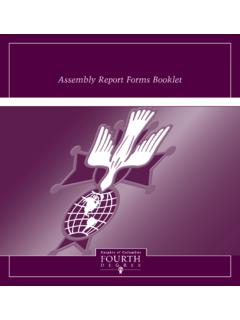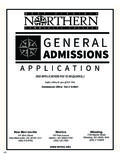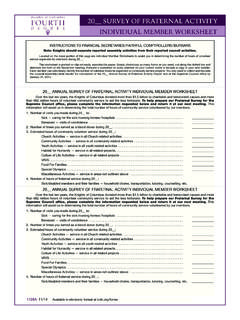Transcription of In-Service Training Schedule Class Descriptions
1 Class Descriptions (Not all classes are currently scheduled. Please refer to the Training Schedule for the most up-to-date Class listings.). Adobe Photoshop for Forensic Video Analysts: Click here for Class details, cost, and registration information. Animal Control Basic: This course if for animal control officers, law enforcement officers and others who are assigned to animal control duties. The course has been expanded from two to three weeks. Some of the course topics are officer safety, use of force on persons, use of force on animals, compassion fatigue, VA animal laws and regulations, search and seizure, constitutional law, evidence collection, animal behavior and care, rabies control, euthanasia overview and certification, animal fighting and cruelty investigation, and animal capture techniques. Applied Evidence-Based Policing Practices: Homicide and Violent Crime Reduction (Online): Although the past several decades have seen a steady decrease in violent crime statistics, homicides and violent crimes continue to have a devastating impact on many of our nation's communities.
2 With long-term social implications and staggering economic consequences, even minimal levels of violent crime diminish the quality of life in affected communities. In response, homicide and violent crime reduction (HVR) remains a top priority for police agencies throughout the nation. The challenge is addressing violent crime with effective interventions and countermeasures. Instead of guessing or speculating on which HVR strategies work best, many agencies are turning to evidence-based policing practices (EBPP). to address the unique needs of the communities they serve. Applied Evidence-Based Policing Practices: Homicide and Violent Crime Reduction (HVR Online) is designed as a rapid eLearn course that provides an overview of the concept of evidence-based policing and examples of practices that have been shown to reduce homicides and violent crime. Crafted with all levels of police practitioners in mind, HVR Online bridges the gap between research and practice.
3 On-screen text, videos and narration in a user-friendly eLearn environment allows participants to start, stop and resume the Training based on their schedules. Participants should expect to spend approximately 2 - 4 hours exploring the resources provided in this dynamic and timely course. This tuition-free online Training is supported by the Department of Justice, Office of Community Oriented Policing services . This course is ideal for law enforcement managers and decision makers, including but not limited to agency heads, directors, command staff, managers, and supervisors in agencies of all sizes. However, the content is also applicable to all law enforcement and criminal justice professionals, as well as any community-policing stakeholders. Once the course is successfully completed, students must print or save the certificate of completion and fax it to the RRCJA @ (540) 371-4404 or email it to Once the certificate of completion is received, 4 hours of career development In-Service credit will be awarded.
4 Students should also provide their agency's Training officer with a copy of the certificate of completion. To register, go to: AR-15/M16 Armorer: This comprehensive AR-15/M16 armorer Class is the most in depth law enforcement armorer course available today. It is not the basic armorer course most manufacturers and others present. In addition, it is rated the highest by over 6,300 law enforcement and government agents who have graduated from the Class . The course is not brand specific. The cost per student is $485. Click here for further information and to register. ATV Operator: This 2 day Class is for agency personnel who have already attended a 40 hour basic driver Training course and are assigned to operate agency ATV's (All Terrain Vehicles) for various enforcement activities. This Training will consist of classroom instruction and range/trail skill courses to familiarize the riders with safety and the proper operation of these vehicles.
5 The laws pertaining to ATV. operation in Virginia will be covered. Upon successful completion of this course, each participant will receive a student performance evaluation card from ASI. Each student must bring a well maintained ATV from their agency and the following safety gear: motorcycle helmet (DOT or Snell approved or full face - NO HALF HELMETS), goggles (VESC-8 safety rated), long sleeve shirt or jacket, motorcycle gloves, long pants, over the ankle low heel riding boots. This course is taught by instructors licensed by the ATV Safety Institute (ASI), a Division of Specialty Vehicle Institute of America (SVIA). Avoiding Operational Pitfalls and Perils in Jail: In the normal course of daily business, the jail staff is faced with potential operational pitfalls and perils that can easily blemish or destroy a jail officer's career. An issue or situation in the jail, improperly handled or overlooked, can result in job termination, civil action, and even criminal prosecution.
6 Jail officers can damage their careers, the well-being of inmates, and violate the public trust if they make mistakes in three key areas: misusing power, not dealing with pressure, and not meeting responsibilities. These are the pitfalls to avoid. This Class reviews several recent court decisions and subsequent case laws that have impacted jail operations. Examples such as sexual misconduct, violating department code of conduct, using excessive force on inmates, and deliberate indifference towards an inmate's needs are common mistakes that have ruined careers, prompted inmate lawsuits, and resulted in criminal prosecution. The goal for this Class is to educate the jail officer on how to think and avoid and prevent these three pitfalls. The Class is designed for sworn line staff, supervisory personnel, and civilian personnel working inside a jail environment. Chemical Immobilization of Animals: VDACS Directive 83-1 was revised in August of 2009 with changes that afford many "field practical" benefits for Virginia Animal Control Officers using Chemical Immobilization.
7 This 3-day Training will provide 14 hours of classroom/lecture/video Training , 2 hours of Hands-On Training (including the use of blowguns, long range projectors, darts, human protective safety equipment, and dart associated radio-tracking devices), and an additional day where participants will fine tune and demonstrate their skills for complete in- Class Officer Directive 83-1 Competency Certification. All officer responsibilities for Directive 83-1 Competency Certification will be completed at the workshop. Participants satisfactorily completing the Training will leave the program with Safe-Capture International Certification, a signed form AC7, and a signed AC8 Part 2 and 3. The only additional requirements will be the signature of your veterinarian acknowledging supervision and that proper protocols are in place (AC8 Part 1, AC9). Participants at the 16 hour Training will receive the 175-page manual: "Chemical Immobilization of Animals: Technical Field Notes 2017", with the following additional Training materials distributed for the Qualification Day Training : Safe-Capture Publication: "Components to Consider Including in a Chemical Capture Protocol for Law Enforcement Compliance to Directive 83-1": This publication provides detailed verbiage describing SOPs for.
8 (1) Justification/Safety Assessment Prior to the Use of Chemical Immobilization (2) Veterinary Contact Prior to Procedure Initiation (3) Use of Remote Drug Delivery Equipment (4) Drug Volume Determination/Dart Preparation (5) Observation of Induction, Initial Animal Care, Anesthetic Monitoring (6) Dart Removal and Wound Care (7) Recovery (8) Record Keeping (9) Projector Maintenance and Storage (10) Procedures For Finding Lost Darts, and provides SOP verbiage as well as resources for Human Health and Safety Protocols. Safe-Capture Publication: "Notes On Virginia Regulations Which Impact The Use of Chemical Immobilization by Animal Control Officers": This publication reviews Directive 83-1 and how the new revisions affect the "field use" and application of Chemical Immobilization Techniques by Animal Control Officers. Safe-Capture Publication: "2017 VDACS Directive 83-1 Chemical Capture Certification Workbook": documenting the ability of the Animal Control Officer to (1) Choose Scenario Appropriate Medications (2) Determine Solution Concentration (3) Use Drug Dosage Reference Tables (4) Perform Drug Calculations (5) Select Appropriate Delivery Equipment Directive 83-1 Qualification Day Activities: Participants will review and complete the additional Training materials described above, as well as spend additional time discussing the function of their specific dart projector.
9 Participants will demonstrate knowledge and proficiency by completing written and live-fire practical examinations utilizing blowguns and powered projectors (including .22 blank, CO2, and Air powered projectors), as well as completing a checklist of dart projector function and field use actions. If you have a dart projector, please bring it with you for the Qualification Day, as well as any operational manuals for your reference. If you do not have a dart projector, you can select the model you would like to qualify with from the many teaching projectors at the program. **Dart Projector Qualification Day attendees must bring with them documentation of current firearms qualification with a conventional firearm.**. Registration Fees: Chemical Immobilization of Animals (16 hours): $725 for Early Registration (Registrations received at least 30 days prior to the program date) and $775 for General Registration (Registrations received less than 30 days prior to the program date).
10 Those who have previously attended the workshop may attend again as a Refresher for $395. "Directive 83-1 Capture Systems Certification Workbook/Dart Projector Qualification Day": $225. (Registrations received at least 30 days prior to the program date) and $275 for General Registration (Registrations received less than 30 days prior to the program date). Safe-Capture's programs have been presented since 1989, and are considered by US government agencies to be the standard in Chemical Immobilization Training . They have provided Training to well over 10,000 professionals in the US, Europe, Asia, Africa, and Canada. They provide evaluation questionnaires to course participants asking for ratings of Excellent, Good, Satisfactory or Disappointing and over 90% of participants have rated their program Excellent! The instructors are veterinarians, as well as elite biologists, all specializing in remote anesthesia.







